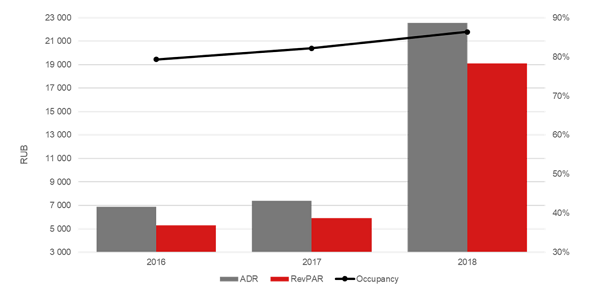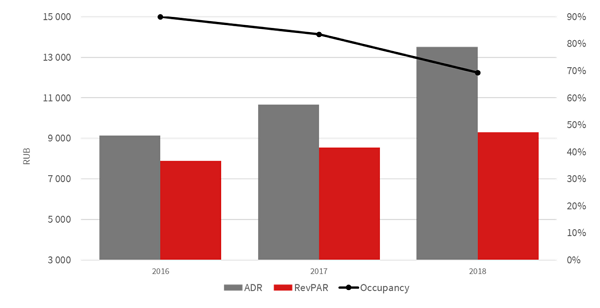Scientific & Practical Journal

Editorial News
Dear readers! We present to you the first issue of 2026, in which we have collected a number of interesting materials on issues of modern logistics.
We are pleased to present to you the final issue of the journal in 2025 and inform you that LOGISTICS is opening a new page in its development by starting cooperation with the Crystal Growth Foundation, which means that the information saturation of the publication will change for the better. The first issue is dedicated to one of the innovative domestic developments, AI-Kantorovich, which the Crystal Growth Foundation created together with Hive Mind AI.
Dear readers! We are pleased to present to you the eleventh issue of the journal in 2025. There are a lot of relevant and useful materials in the issue, which, hopefully, will not be ignored.
PHOTO OF THE WEEK
CITATIONS
All News of Logistics
World Cup 2018 results on the two main Russian hotel markets
Moscow hotels increased prices threefold in June-July, occupancy in St. Petersburg fell against the background of a 30% rate increase
Summer 2018 in hotel markets of two Russian capitals passed under the sign of the World Cup. The championship had different influences on hotels in Moscow and St. Petersburg. In this review, JLL summarizes the results of June and July for branded market players[1] compared to the base year 2016 and to 2017, which was marked by the Confederations Cup.
The most significant influence of the large-scale event of 2018 has been on rates: the average price (ADR) for the months of the Championship in Moscow was RUB22,600, which is three times higher than in 2017 (RUB7,400). The Northern capital also took advantage of the rush demand: hoteliers raised prices by 30% compared to 2017, to RUB13,500.
Moscow branded hotel market results, June-July

Source: STR, JLL
“July largely continued the trends that were set by June. Apparently, in the process of event preparations, the accommodation in Moscow as the central hub of the championship was more in demand, but after the championship the demand winded down, there was no prolonged effect observed: the fans didn’t stay in the city as tourists to see the sights. This is clearly visible from analyzing the occupancy figures: 89% sold rooms in June in Moscow and ‘only’ 84% in July. In St. Petersburg, the percentage of occupied rooms was roughly even between the two months: 69.1% in June and 69.6% in July,” – says Tatiana Veller, Head of JLL Hotels & Hospitality Group, Russia & CIS. – “ADR also followed this trend: in Moscow, the average market price for all segments was RUB20,800 in June and RUB20,600 in July. The situation is more pronounced in St. Petersburg: RUB14,600 in June and RUB12,400 in July.”
St. Petersburg branded hotel market results, June-July

Source: STR, JLL
The record holders for the two months of the competition of the Moscow hotel market were:
- by occupancy dynamics – Luxury segment (+12 ppt to the previous year, up to 86%);
- by occupancy level – Upper Midscale segment (91% of the sold rooms);
- by ADR dynamics – Luxury (growth by 4 times, up to RUB71,200);
- by RevPAR dynamics – Luxury (366% growth, up to RUB 60,900).
In St. Petersburg:
- by occupancy dynamics – unfortunately, here we are talking about the minimum losses among the segments, and this is the Upscale segment, where the occupancy decreased by 5 ppt in comparison with two similar months of the previous year, to the level of 84% (that made this segment also a leader in terms of occupancy);
- by ADR dynamics – Midscale segment (41% growth, up to RUB7,200);
- by RevPAR dynamics – Upscale segment (growth of 22%, up to RUB10,200).
“In general, it is worth noting that the World Cup Championship didn’t bring the expected results to the hoteliers of the Northern capital. Judging by the dynamics of the indices in certain segments of the market (the lower the segment, the more pronounced the growth in prices in percentage terms), the event attracted mainly price-conscious demand, while discouraging traditional tourists. No doubt, Moscow benefitted, completely meeting the forecasts both for the price increase and for the occupancy growth. We can say with full confidence, that this summer’s records of ADR and occupancy in hotels of the Russian capital are unlikely to be repeated soon.” – notes Tatiana Veller.
Despite very different results, both markets managed to increase the profitability of rooms in the first two months of this summer, however, at varying levels: in Moscow, RevPAR rose by 224%, to RUB19,100, while in St. Petersburg, it grew only by 9%, to RUB9,300.
“We should take into account that in the last four years before the Championship – the period of most active preparations of the hotel market of two cities for the event – 5,400 branded rooms were introduced in Moscow, and more than 1,100 rooms appeared in St. Petersburg. Considering this supply growth, we can call the operating results of hotels during the Football Cup quite satisfactory, because it was a tight fight for a very ‘dear’ visitor (in all meanings) amidst growing competition and the quality of supply in the market.” – concludes Tatiana Veller.
[1] Analysis based on STR data. The basis of the analysis is the hotels under international and local brands.












